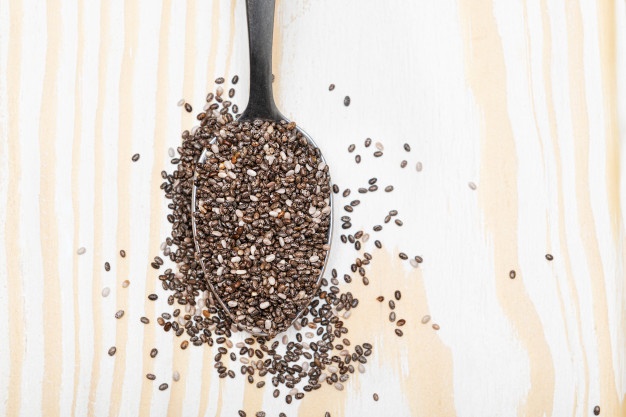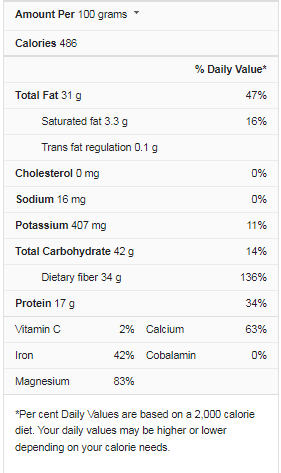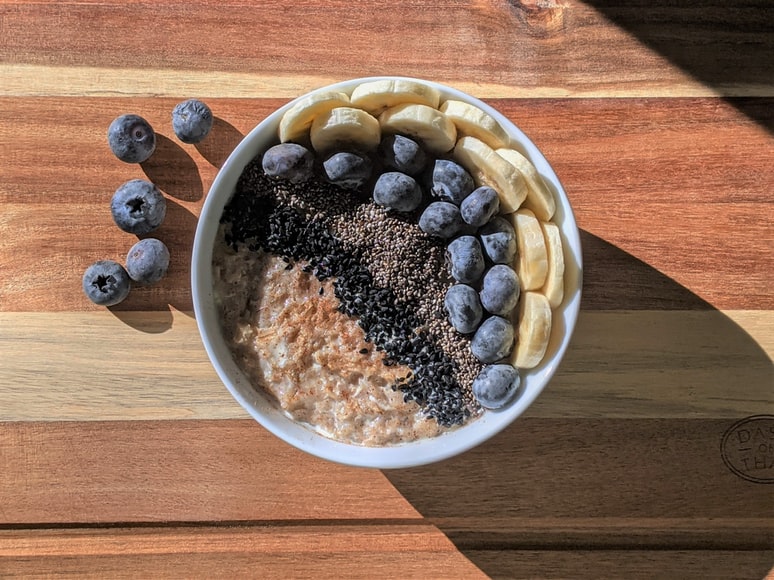Chia seeds have ten grams of fiber per ounce, making them one of the highest-fiber foods available. Fiber not only digests more slowly than many other foods, keeping you fuller for longer, but it also aids in the maintenance of regular bowel movements and the prevention of constipation.
Chia Seeds Nutrition Facts
What Are The Benefits Of Chia Seeds?
Chia seeds contain quercetin, an antioxidant that can help you avoid various illnesses, including heart disease. The seeds are also high in fiber, which can help to lower blood pressure and, as a result, minimize your risk of heart disease. Chia seeds have a high fiber content.
0.7 ounces (20 grams or 1.5 teaspoons) of chia seeds twice a day is a standard dosing suggestion. To avoid any digestion issues, remember to drink enough water. Chia seeds are simple and frequently used as an egg substitute and in oatmeal and smoothies.
When Should You Consume Chia Seeds?
Early in the morning, Chia seeds are best consumed first thing in the morning, especially on an empty stomach, as they boost metabolism and aid digestion of all meals throughout the day.
However, some study suggests that consuming them at night can help you get a better night’s sleep.
To get the advantages, all you have to do is dissolve chia seeds in water and drink it first thing in the morning or at any other time of the day.
Some Factor To Consider About Nutrition Facts Of Chia Seeds
- Chia seeds are oval-shaped and less than a millimeter in diameter. They’re available in white and black varieties, although some have marbled dark gray coloration. They have a mild flavor and are virtually undetectable. They are naturally high in omega-3 fatty acids, which improve heart health by lowering cholesterol, regulating blood pressure, and preventing blood clots.
- Chia seeds contain more than just fiber; and they also have a high concentration of antioxidants. A single ounce of chia seed contains eight grams of healthy fat, 60% of which is omega-3 fatty acids. These fatty acids improve the functioning of the heart, help lower cholesterol, and regulate blood pressure. In addition, they help to reduce inflammation and prevent blood clots.
- Chia seeds are a plant-based source of complete protein, and they also contain essential minerals and micronutrients. A tbsp of chia seed can provide 179 mg of calcium and 2.2g of iron. They are a good source of magnesium and zinc and may even help vegetarians fill nutritional gaps. It is also rich in fiber and Omega-3 fatty acids.
- Despite their high nutrient content, chia seeds aren’t a good source of vitamins and minerals. They contain a high amount of manganese, essential for metabolism, growth, and development. They also contain iron, which is needed to produce red blood cells, which carry oxygen around the body. In addition, chia seed contains nine essential amino acids.
- Chia seeds contain 11 grams of fiber per ounce. A tbsp of chia seed contains approximately 35 grams of fiber daily. That’s the same as a serving of flax seeds. And they’re packed with omega-3 fatty acids, which are essential for heart health. They also help lower cholesterol and regulate blood pressure. Besides their benefits in heart health, chia seeds are also great for gut health.
- While chia seeds are rich in omega-3 fatty acids, they don’t contain many carbohydrates. Most of the carbohydrates that they do contain come from fiber. That means chia seeds are a good source of fiber and have other benefits. They are high in omega-3 fatty acids, which may lower cholesterol. Moreover, they reduce inflammation and prevent blood clots.
- In addition to boosting the immune system and lowering cholesterol, chia seeds contain fiber. Each tbsp of chia seeds contains 6.72 g of Omega-3, and that’s more than the recommended amount of fiber for adults. And if you’re trying to lose weight, a tbsp of CHIA seeds is a great option.
Chia Seeds Have 7 Intriguing Health Benefits
1. They’re Highly Nutritious
Chia seeds come from Salvia hispanica L. and are tiny black or white seeds. They’re thought to be from Central America.
The seeds were historically employed in the meals of the Aztec and Mayan civilizations and for medicinal purposes, religious rites, and cosmetics. Individuals now consume chia seeds all over the globe.
Chia seeds were highly nourishing by ancient cultures, supported by current science. One ounce of chia seeds (28 grams or two teaspoons) includes.
2. They’re High In Antioxidants
Chia seeds are a good source of antioxidants as well.
Antioxidants promote human health by neutralizing reactive molecules known as free radicals, which can harm cell compounds if they build up in the body.
Free radical damage, for example, contributes to aging and diseases such as cancer.
Chlorogenic acid, caffeic acid, myricetin, quercetin, and kaempferol are antioxidants found in chia seeds. These may all have heart and liver-protective characteristics, as well as anti-cancer capabilities.
Chlorogenic acid, for example, may assist in decreasing blood pressure, whereas caffeic acid has anti-inflammatory properties.
3. It Might Help You Lose Weight
Chia seeds include fiber and protein, which may help reduce weight.
Chia seeds contain about 10 grams of nutritional fiber per ounce (28 grams), implying they contain a staggering 35% fiber by weight. Soluble fiber makes up most of the fiber in chia seeds, and it absorbs water, turns into a gel, and swells in your stomach to help you digest food more slowly and feel fuller after a meal.
As a result, it’s been suggested that soluble fiber can help with hunger control and weight loss. Although there is conflicting evidence on this subject, some studies suggest that dietary fiber may help prevent overweight and obesity.
Furthermore, the protein in chia seeds may aid in the reduction of hunger and food consumption. One study in 24 participants found that eating 0.33 ounces (7 grams) or 0.5 ounces (14 grams) of chia seeds mixed with yogurt for breakfast increased feelings of fullness and reduced food intake in the short term compared with eating chia-free yogurt.
Despite this, investigations on the usefulness of chia seeds for weight loss have yielded conflicting results. A prior study from 2009 found that taking 50 grams of chia seed supplements per day for 12 weeks did not affect body weight or health markers, including blood pressure and inflammatory markers, in 90 overweight people.
In contrast, a 6-month trial of 77 overweight or obese persons with type 2 diabetes on a low-calorie diet revealed that those who took chia seeds daily lost considerably more weight than those who took a placebo.
Though chia seeds by themselves are unlikely to produce weight reduction, they can be a helpful supplement to a balanced, healthy diet if you’re attempting to reduce weight.
4. It Has The Potential To Reduce Your Risk Of Heart Disease
Consuming chia seeds, which are abundant in fiber and omega-3 fatty acids, may lower your risk of heart disease.
Soluble fiber, such as that contained in chia seeds, can aid in the reduction of total and LDL (harmful) cholesterol levels in the blood. As a result, your risk of heart disease may be reduced.
The omega-3 fatty acid ALA found in chia seeds has also been linked to a lower risk of heart disease.
Nonetheless, research on the link between chia seeds and heart health have yielded equivocal results.
In rat tests, chia seeds have been found to reduce certain heart disease risk factors, such as excessive triglyceride and oxidative stress levels.
In a small number of human investigations, chia seed supplements were found to dramatically lower blood pressure in persons with hypertension, or high blood pressure, which is a significant risk factor for heart disease.
5. They’re High In Vital Bone Nutrients
Chia seeds are abundant in calcium, phosphorus, and magnesium, all critical elements for bone health.
According to several observational studies, getting enough of these nutrients is critical for maintaining good bone mineral density, a measure of bone strength.
Furthermore, the ALA found in chia seeds may help with bone health. Consumption of this vitamin has also been linked to enhanced bone mineral density in observational studies.
As a result, consuming chia seeds regularly will probably help maintain your bones strong.
In one animal study, rats given chia seeds regularly for roughly 13 months had higher bone mineral content than the control group. The authors concluded that ALA may have played a role in this advantage.
However, aside from animal studies, only a few studies have looked into this area in depth. In the end, more human research is required.
6. It Has The Potential To Lower Blood Sugar Levels
Chia seeds may help regulate blood sugar levels, potentially due to their high fiber content and other beneficial components.
High blood sugar levels might be a problem for people with diabetes. Fasting blood sugar levels consistently high are linked to an increased risk of various problems, including heart disease.
Chia seeds have been shown in animal tests to improve insulin sensitivity, which is promising. This could assist in keeping blood sugar levels in check after a meal.
Research is limited. However, some older trials have yielded encouraging results.
Older research from 2010 and 2013 reveals that eating bread with chia seeds helps healthy people minimize post-meal blood sugar rises compared to eating without chia seeds.
However, more research is needed to discover the link between these healthy seeds and blood sugar management.
7. Simple To Include In Your Diet
Chia seeds are pretty simple to include in your diet. Because they have a mild flavor, you may use them in almost any recipe.
They don’t require grinding, cooking, or other preparation, making them convenient for recipes.
They can be consumed raw, soaked in juice, or blended into porridge, pudding, smoothies, and baked products. You may also use them to garnish on cereal, yogurt, veggies, and rice meals. They also perform well as a binding agent in handmade fritters.
You can use them to thicken sauces and as an egg substitute because of their capacity to absorb water and fat. They can also be made into a gel by mixing them with water.
The seeds seem to be tolerated nicely. If you’re not used to eating a lot of fiber, though, consuming too many seeds in one sitting may cause digestive issues like bloating or diarrhea.
0.7 ounces (20 grams or 1.5 teaspoons) of chia seeds twice a day is a standard dosing suggestion. To avoid any digestion issues, remember to drink enough water.
Conclusion
Although chia seeds are a multi-purpose food, they are often considered a superfood or functional food. Both varieties are nutritious, and both types can be mixed into many different dishes. However, it’s important to remember that there is a difference in nutritional content between the two. You should soak chia seeds for at least 15 minutes before eating them. It’s also important to note that soaked chia seeds can cause an esophageal block, so you’ll want to ensure that you rinse them well before consuming them.
Chia seeds are a good source of dietary fiber. Fiber can help regulate blood sugar levels and help the digestive process, and it can help control cholesterol and maintain a healthy weight. While too much of any fiber can cause gastrointestinal problems, chia seeds are an excellent source of fiber. A tbsp of chia seeds will contain nine grams of fiber, which is an excellent source of dietary fiber.





